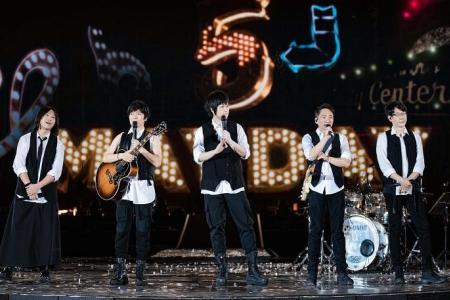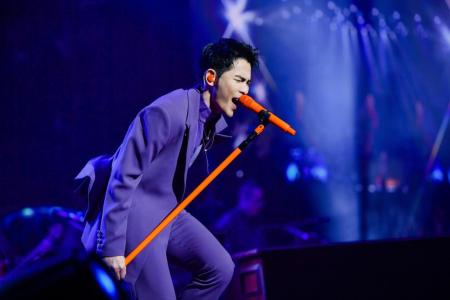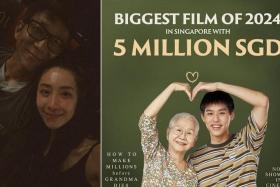Taiwanese fans call out local celebs for their pro-China statements
TAIPEI – The Instagram account belonging to Taiwanese rock band Mayday has been flooded with thousands of angry comments – many from Taiwanese users claiming to be the group’s most loyal fans.
“Thank you for keeping me company for 20 years, but that ends here. I’m too disappointed,” read one comment.
Another fan wrote: “I have loved your music for a long time, but I love Taiwan more.”
The backlash comes after the band’s lead singer, Ashin, appeared to claim a Chinese identity during a concert in Beijing on May 25.
“We Chinese, when we come to Beijing, must eat roast duck,” he said onstage to rapturous cheers and applause.
The comment quickly became a trending topic on Chinese microblogging site Weibo, where local fans praised the band for “speaking the truth”.
Beijing views Taiwan as its own territory and seeks “peaceful reunification” with the island, though it has never ruled out the use of force, if necessary.
In Taiwan, however, it was a different story.
Ashin was only one of at least 70 Taiwanese celebrities who have made pro-China statements in the past two weeks – a trend which has sparked widespread anger among Taiwanese who have accused them of “selling out” their identity for gains in the lucrative and massive Chinese market.
Dozens of celebrities, for instance, have reshared on their social media accounts a post by Chinese state television channel CCTV on Weibo that described Taiwan independence as a “dead end”, and said that reunification with China is “unstoppable”.
Taiwanese artistes have reshared the post, including singers Rainie Yang, Angela Chang and Jeff Chang, and television host Patty Hou.
On May 25, Taiwanese powerhouse ballad singer Jam Hsiao said on Facebook that he was “proud to be a member of the zhonghua minzu” – the Chinese nation – and that he would continue to work hard and be an “upright Chinese”.
While Taiwanese entertainers have faced political pressure in China to make such statements for years, this recent wave comes in the wake of the May 20 inauguration of Taiwan President Lai Ching-te, whom Beijing has repeatedly denounced as a “dangerous separatist” and “troublemaker”.
In his inaugural speech, Mr Lai angered Beijing when he said that “the Republic of China and the People’s Republic of China are not subordinate to each other”, using the official names of the two sides of the strait.
In Taiwan, the trend has caught the attention of politicians across party lines, who have condemned Beijing for appearing to coerce the performers into making the pronouncements.
Dr Tsai Ming-yen, director-general of Taiwan’s National Security Bureau, said in a parliamentary session on May 29 that the Communist Party of China requires Taiwanese performers working in the country to sign consent forms agreeing to push a unification agenda.
They are threatened with possible tax audits and other actions if they do not conform, Dr Tsai added.
Opposition legislator Lee Yen-hsiu, from the traditionally Beijing-friendly Kuomintang, said that Chinese pressure on entertainers to make political statements is not helpful in building goodwill between the two sides of the strait.
In China, however, the Taiwan Affairs Office (TAO) blamed the ruling independence-leaning Democratic Progressive Party for “deliberately creating cross-strait confrontations” out of political self-interests by claiming that the celebrities had made forced statements.
“These are all natural expressions of true feelings,” TAO spokeswoman Zhu Fenglian said at a press conference on May 29.
Beijing’s particular distrust of Taiwan’s new president and his party – which is taking on an unprecedented third term – leaves little room for any Taiwanese wanting to do business in China to be fuzzy about their political leanings, experts said.
Celebrities are a natural target as they wield significant influence, especially among young people.
“It’s all part of China’s efforts to divide Taiwanese society and influence public opinion,” said National Taiwan University associate professor Chen Shih-min.
“Are you for the DPP or against them? Beijing will continue to intensify its pressure on Lai and the DPP administration in order to discredit them,” added Prof Chen, a political scientist.
The moves are unlikely to work in the way Beijing hopes, though, he said.
“Taiwan’s younger generation has no emotional attachment to China. More and more people identify as Taiwanese and not Chinese, so whenever someone does something that appears to be too close to Beijing, it sparks fear that they are not protecting Taiwan’s interests,” said Prof Chen.
According to the latest results of a long-running survey in Taiwan by National Chengchi University released in February, 61.7 per cent of respondents identified as distinctly Taiwanese, a big jump from the 17.6 per cent who said so in 1992 when the poll was first conducted.
Around a third, or 32 per cent of respondents, said they identified as both Taiwanese and Chinese, while a minuscule 2.4 per cent said they viewed themselves as solely Chinese.
Another poll by the university shows that only 1.2 per cent of respondents want to pursue unification with China as soon as possible. The overwhelming majority of around 88.8 per cent prefer the status quo of de facto independence.
Dr Xu Jian, an expert on Chinese celebrity studies and digital media at Australia’s Deakin University, said the politicisation of Taiwanese celebrities on both sides of the strait have made them “powerless and vulnerable”.
“They can choose only one side to stand on, and can’t satisfy the governments and the public on both sides,” he said.
It also represents a missed opportunity for the celebrities to help promote positive cross-strait relations, Dr Xu added.
“Rather than become a frequent target of political controversies, Taiwan celebrities could become cultural ambassadors to promote mutual understanding,” he said.
Get The New Paper on your phone with the free TNP app. Download from the Apple App Store or Google Play Store now




